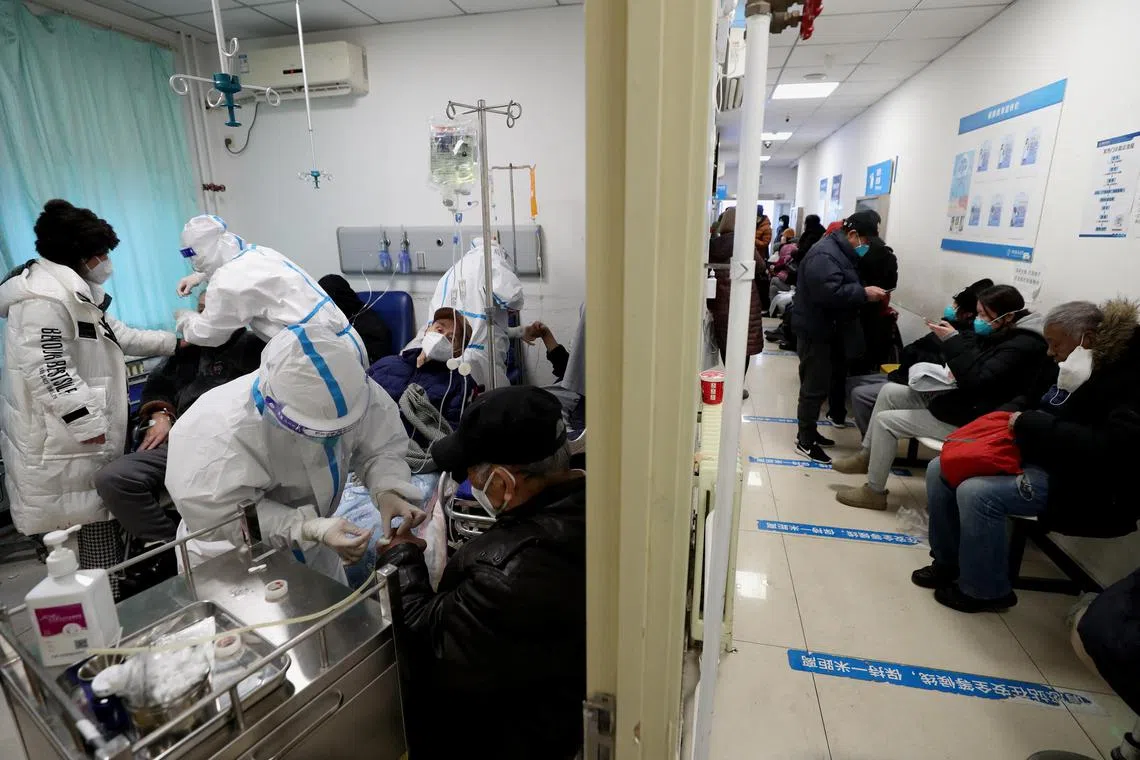Ex-food and drug regulator calls for China to spread out medical resources, increase transparency
Sign up now: Get ST's newsletters delivered to your inbox

Medical workers in protective suits attending to patients in a hospital in Beijing, on Dec 27, 2022.
PHOTO: REUTERS
Follow topic:
BEIJING - The Covid-19 pandemic exposed flaws in China’s healthcare system that need to be remedied, a former top official said on Saturday.
Too many medical resources are concentrated in urban areas, while there is also a lot of medical wastage on account of people stockpiling medication, said former head of the China Food and Drug Administration Bi Jingquan.
He was speaking to an audience of business leaders and executives at the China Development Forum in Beijing during a panel discussion on healthcare resilience.
“Under the impact of the epidemic of the century, China’s public health and medical system has withstood the test. But some problems have also been exposed.
“Too many medical resources are concentrated in big cities, and the problem of weak public health and medical services in rural areas and communities is still prominent,” said Mr Bi, who is now executive vice-chairman of the China Centre for International Economic Exchanges.
More family doctors and general practitioners should move into the countryside to better serve the community, Mr Bi said.
Calling for a shift in thinking about medical care, he said patients should understand the concept of paying for consultation, rather than being willing to pay only for medication, which results in doctors overprescribing drugs. This in turn leads to wastage when people hoard the medicine until they expire.
China is still in the process of establishing a network of general practitioners and family doctors, putting most of the healthcare burden on hospitals.
These got severely overwhelmed when Covid-19 ripped through the country in late 2022 after Beijing lifted its strict zero-Covid policy,
China has 2.2 physicians for every 1,000 people. In comparison, Singapore has 2.7 doctors for every 1,000.
To bolster trust in the system, physicians should also be assessed by professional associations, rather than on the basis of the number of papers they publish, he added.
“The quality of our biomedical innovation is still far behind that of developed countries and (their) multinational companies,” he said.
“To promote high-quality development of the biomedical industry, companies should be allowed to negotiate with medical institutions to determine the price of new drugs.
“The pricing of Western medicine is an extremely important and sensitive issue, so this kind of risk is extremely high, and it requires continuous exploration and trial-and-error decision-making,” Mr Bi added.
Furthermore, there should be more transparency in the drug review and approval process, he said, with efficacy data also published.
A member of the Chinese People’s Political Consultative Conference – a political advisory body – Mr Bi had in 2021 urged China’s pharmaceutical firms to be more open about vaccine efficacy data to build trust in their products.
Lasting till Monday, the China Development Forum brings together international head honchos such as Apple chief executive Tim Cook,
Singapore’s Senior Minister Tharman Shanmugaratnam is also expected to speak at a session on Sunday.


